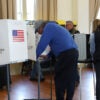The House Energy and Commerce Committee has passed a bill to lift America’s decades-long ban on crude oil. Three Democrats joined all of the Republicans in passing the bill out of committee, 31-19.
The bill now goes to the full House for passage.
The White House opposes the bill, with spokesman Josh Earnest saying:
This is a policy decision that is made over at the Commerce Department, and for that reason, we wouldn’t support legislation like the one that’s been put forward by Republicans.
The decision to export crude oil, however, should be made not by bureaucrats in Washington, but by companies and individuals (who are best at making that choice).
Unlike Venezuela, Russia, China, and others, American oil production is not a state-owned enterprise. The United States benefits from free trade and a robust energy economy because of strong private property rights.
Individuals in the U.S. have largely owned and been able to produce natural resources in America. Private property rights are a critical reason why the U.S. is a global energy leader.
The U.S. is a leader in energy despite government obstacles—such as the ban on exporting crude oil and lengthy review periods for permit drilling activities.
The narrative is written pretty clearly.
When the government gets out of the way, the energy sector succeeds. Government intervention, on the other hand, cripples production, innovation, and job creation.
The policy fix is therefore a no-brainer. Congress should simply lift the ban.
The problem, however, is that policymakers who want something else see an opportunity for horse trading.
Josh Earnest says, “… we wouldn’t support legislation like the one that’s been put forward by Republicans,” adding that “[t]he administration believes that the American people are better served by making sure that we pursue the kind of approach that also invests in renewable energy.”
This is the Washington mentality, case in point, with the White House and Democrats asking, “What can I get for it?”
For example, Sen. Heidi Heitkamp, D-N.D., said that a deal could be struck that includes extended handouts for wind and solar companies, the beneficiaries of targeted tax credits. Heitkamp remarked:
This is an opportunity to make an argument about production tax credits and investment tax credits in the context of giving certainty, across the board, to the energy industry and truly supporting an all-of-the-above policy.
But why should Americans favor getting rid of a failed policy such as the crude oil export ban, which hasn’t allowed the free market to succeed, by entrenching another policy that does the exact opposite—through government handouts to failed companies like Solyndra? Why is the deal always “We’ll agree to support a new wrongheaded policy or dole out more money for an existing wrongheaded policy if you offer to lighten up a little on one of your old wrongheaded policies”?
That’s not a bargain members should make, because it supports cronyist policies that reward special interests at the expense of taxpayers, entrepreneurs not connected to Washington, and the economy broadly.
On the other hand, opening markets to both imports and exports fosters innovation as companies face more competition and meet challenges to retain or expand their market share.
The outcome of open markets is new ideas, higher-quality products at competitive prices, and an improving standard of living.
It is true that lawmakers are very quick to be concerned regarding gas prices for fear of constituent backlash—but this won’t do that. By lifting the ban, Americans will stand to benefit from a more efficient global oil market through lower prices and an increase in economic activity.
The Government Accountability Office (GAO) reviewed four economic studies on lifting restrictions on crude oil exports and summarized that gas prices could decrease anywhere from 1.3 cents to 13 cents per gallon.
Additionally, the U.S. Energy Information Administration recently conducted its own study, concluding that “[p]etroleum product prices in the United States, including gasoline prices, would be either unchanged or slightly reduced by the removal of current restrictions on crude oil exports.”
Although the price impact at the pump may seem marginal, the direction is clear that prices will fall.
Not only do the savings add up over time, but so do the widely expanded economic benefits. One study estimates that opening markets to crude exports will save American consumers an estimated $5.8 billion over a 20-year period, increase America’s gross domestic product by over $38 billion, and add more than 300,000 jobs by 2020.
Though the likely impact is lower gas prices, whether gas prices rise or fall should not be the metric for weighing the policy decision.
Free trade allocates goods to their highest valued use, and the result is a mutually beneficial outcome. The overall wealth and economic benefits created by opening up markets far outweighs the negative effects on impacted domestic users even if the price were to rise.
Lifting the ban would also result in important geopolitical benefits. Removing restrictions on crude oil exports would improve national security around the world by reducing any one nation’s ability to manipulate energy supplies for political and economic influence.
Recognizing the economic and geopolitical benefits, lifting the ban has widespread support. Business groups; unions; a host of editorial boards including the Washington Post, the Wall Street Journal, the Boston Globe, the Financial Times, and more; and nearly 70 percent of voters favor freely trading oil.
Americans shouldn’t have to take two steps backward in extending bad policies that reward special interests and political preferences in order to move a step forward in making America’s energy economy freer and more prosperous.
Lifting the ban should not be a bargaining chip. It is sound policy on its own.
































One Reply to “Why Democrats Are Wrong to Use the Crude Oil Export Ban as a Bargaining Tactic”